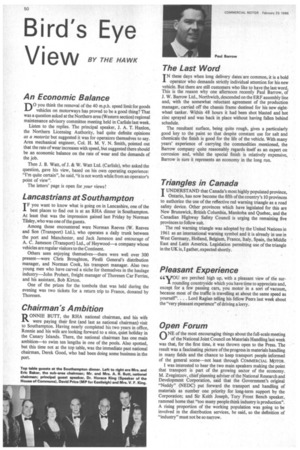Bird's Eye
Page 52

If you've noticed an error in this article please click here to report it so we can fix it.
ViewBY THE HAWK
An Economic Balance
DO you think the removal of the 40 m.p.h. speed limit for goods vehicles on motorways has proved to be a good thing? That was a question asked at the Northern area (Western section) regional maintenance advisory committee meeting held in Carlisle last week. Listen to the replies. The principal speaker, J. A. T. Hanlon, the Northern Licensing Authority, had quite definite opinions as a motorist but suggested it was for operators themselves to say. Area mechanical engineer, Col. H. M. V. N. Smith, pointed out that the rate of wear increases with speed, but suggested there should be an economic balance on the rate of wear and the demands of the job. Then J. B. Watt, of J. & W. Watt Ltd. (Carlisle), who asked the question, gave his view, based on his own operating experience: "I'm quite certain", he said, "it is not worth while from an operator's point of view". The letters' page is open for your views !
Lancastrians at Southampton
T F you want to know what is going on in Lancashire, one of the best places to find out is at an RHA dinner in Southampton. At least that was the impression gained last Friday by Norman Tilsley, who was one of the guests. Among those encountered were Norman Reeves (W. Reeves and Son (Transport) Ltd.), who operates a daily trunk between the port and Manchester, and Jack Jameson and entourage of A. C. Jameson (Transport) Ltd., of Heywood—a company whose vehicles are regular visitors to the Continent. Others seen enjoying themselves—there were well over 300 present—were Chris Broughton, Pirelli General's distribution manager. and Norman Cook, his transport manager. Also two young men who have carved a niche for themselves in the haulage industry—John Probert, freight manager of Thoresen Car Ferries, and his assistant, Bob Kirton. One of the prizes for the tombola that was held during the evening was two tickets for a return trip to France, donated by Thoresen.
Chairman's Ambition
RONNIE BUTT, the RHA national chairman, and his wife were paying their first (and last as national chairman) visit to Southampton. Having nearly completed his two years in office, Ronnie and his wife are looking forward to a nice, quiet holiday in the Canary Islands. There, the national chairman has one main ambition—to swim ten lengths in one of the pools. Also spotted, but this time not at the top table, was the immediate past national chairman, Derek Good, who had been doing some business in the port.
The Last Word
TN these days when long delivery dates are common, it is a bold operator who demands strictly individual attention for his new vehicle. But there are still customers who like to have the last word. This is the reason why one afternoon recently Paul Barrow, of J. W. Barrow Ltd., Northwich, descended on the ERE assembly line and, with the somewhat reluctant agreement of the production manager, carried off the chassis frame destined for his new eightwheel tanker. Within 48 hours it had been shot blasted and hot zinc sprayed and was back in place without having fallen behind schedule. The resultant surface, being quite rough, gives a particularly good key to the paint so that despite constant use for salt and chemicals the finish is good for the life of the vehicle. With many years' experience of carrying the commodities mentioned, the Barrow company quite reasonably regards itself as an expert on corrosion and, whilst the special finish is relatively expensive, Barrow is sure it represents an economy in the long run.
Triangles in Canada
T UNDERSTAND that Canada's most highly populated province, Ontario, has now become the fifth of the country's 10 provinces to authorize the use of the reflective red warning triangle as a road safety device. Other provinces which have legislated for this are New Brunswick, British Columbia, Manitoba and Quebec, and the Canadian Highway Safety Council is urging the remaining five provinces to follow suit. The red warning triangle was adopted by the United Nations in 1961 as an international warning symbol and it is already in use in West Germany, Holland, Belgium, France, Italy, Spain, the Middle East and Latin America. Legislation permitting use of the triangle in the UK is, I gather, expected shortly.
Pleasant Experience
GCVOU are perched high up, with a pleasant view of the sur rounding countryside which you have time to appreciate and, except for a few passing cars, you motor in a sort of vacuum, because most of the traffic is travelling at about the same speed as yourself". . . Lord Raglan telling his fellow Peers last week about the "very pleasant experience" of driving a lorry.
Open Forum
ONE of the most encouraging things about the full-scale meeting of the National Joint Council on Materials Handling last week was that, for the first time, it was thrown open to the Press. The result was a fascinating picture of the progress in materials handling in many fields and the chance to keep transport people informed of the general scene—not least through COMMERCIAL MOTOR. I was interested to hear the two main speakers making the point that transport is part of the growing sector of the economy. M. Zvegintzov, chief planning adviser of the National Research and Development Corporation, said that the Government's original "Neddy" (NEDC) put forward the transport and handling of materials as number one priority for long-term support by the Corporation; and Sir Keith Joseph, Tory Front Bench speaker, rammed home that "too many people think industry is production". A rising proportion of the working population was going to be involved in the distribution services, he said, so the definition of "industry" must not be so narrow.




























































































































